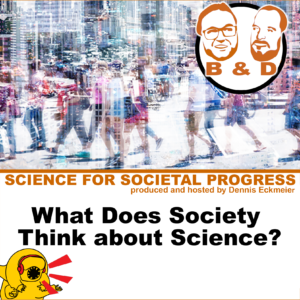Podcast: Play in new window | Download (Duration: 38:48 — 19.9MB)
Subscribe: Google Podcasts | RSS | More

In this episode, Bart and I talk about Wissenschaftsbarometer or “science barometer”. This annual survey in Germany and Switzerland is about the public’s trust in science and scientists. Afterward, we talk about a similar survey in the USA, published by the Pew Foundation a few months earlier. For each survey, we picked a couple of questions and interpret the answers.
As a side note: The extended version of this episode has two parts. Each one is more than an hour long. You can access both parts by becoming a supporter on Patreon. In the past, we asked for a minimum pledge of $5.99 per month for this perk. But now, any pledge will grant you access!
Wissenschaftsbarometer
(find the links to this survey in the sources, below)
How much do you trust scientists and other public professions?
Respondents trusted scientists at public research institutes and universities the most when compared to scientists in industry, the media, and politics. However, it’s still just about 56%. Maybe it’s because for some people it depends on the fields of research whether they agree with the scientific consensus.
Would you want to see how scientists work?
An astonishing amount of respondents would like to watch scientists work in the lab (65%). Bart and I wonder how this could be made interesting. Most days in a scientist’s life are rather boring for the typical spectator. It’s refreshing that open days at universities are indeed visited well. Bart also mentions an uplifting study about how interested people with different political views are in science.
Is the public sufficiently involved in decisions about science?
51% feel like they should have more say in this. This reminded Bart of the project “Fit for Responsible Research and Innovation”. They are promoting the involvement of stakeholders from society in research from the beginning (see sources). The discussion leads us to acknowledge the constantly changing economy and job market, and how this needs to be addressed. But overall it might be overkill to ask the public for permission for every little experiment.
What are we taking out of this?
What stuck with me was that most people do claim to trust in science. But Wissenschaftsbarometer does not investigate possible reasons why still a large proportion of citizens don’t.
Pew Research Survey Trust and Mistrust in Americans’ Views of Scientific Experts
(link in the sources)
Confidence in scientists to work in the public interest is rising. But views on environmental research scientists, in particular, are a bit confusing.
We were surprised to find so much less confidence in health specialists and environmental research scientists than in scientists in general. The respondents consider environmental research scientists “good people”. Yet, at the same time, they have little trust in environmental scientists to communicate their findings, to admit possible mistakes, or to reveal conflicts of interest. I try to explain it with the often encountered argument that environmental scientists had financial pressures. Something about which Americans seem to be more forgiving than Europeans … Maybe?
My Take-Home
A major problem – in my opinion – is that identities often dictate which scientific facts people are comfortable accepting. Many science communicators provide facts nicely packaged for lay audiences and point out the benefits we all enjoy thanks to scientific progress. But they almost exclusively reach those who are already convinced.
When the science interferes with people’s identities, interests, and convictions – and those are the people who we’d like to convince – getting their attention is a major challenge. In the interview with Deboki Chakravarti (see sources), she points out how she was able to reach her audience on YouTube. Her subscribers didn’t know her as a scientist but as a book lover. Other examples are communicators like Prof. Katharine Hayhoe, or Prof. Amanda Glaze, who talk about climate change and evolution, respectively, from within conservative Christian communities.
This is not to say that without such ties your science communication was useless. The more accessible you make science the more likely you will reach some of the hard cases.
Do you have questions, comments or suggestion? Email info@scienceforprogress.eu, write us on facebook or twitter, or leave us a video message on Skype for dennis.eckmeier.
Also, repetition works. The more often you hear an opinion, the more likely you will – intuitively – accept it. Political populism utilizes this human weakness, so why not use it to our advantage, too. Promote scientifically informed opinions publicly, as often as possible!